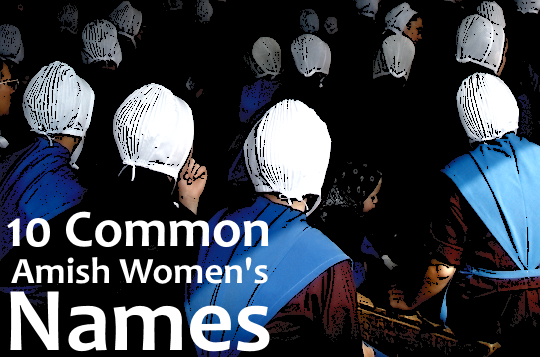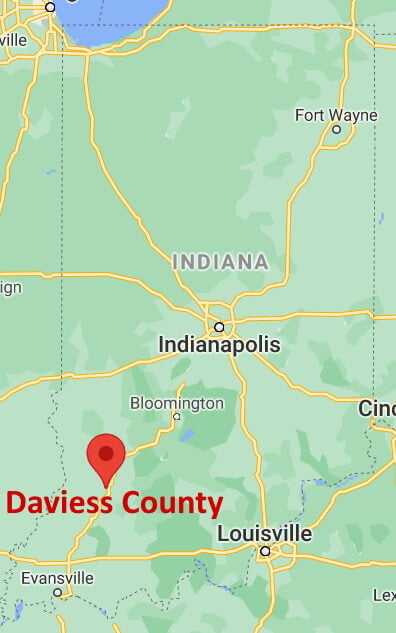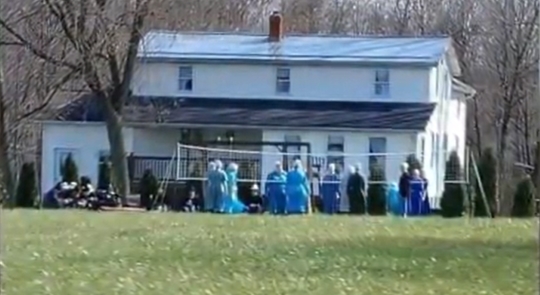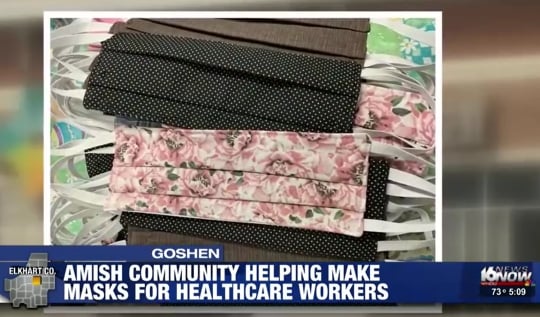Amish & COVID-19: Impact On Tourism, Mud Sales, Businesses & More
With COVID-19 and coronavirus heavy on people’s minds, I’ve been curious for more on how this relates to the Amish, especially following the piece on the Amish and coronavirus on Friday.
I’ve wondered how the Amish will respond to this situation. Will they significantly change their social behavior? What about schools and church? Will mud sales continue?

Also, how will it affect tourism and general business activity in their communities (which many Amish families depend upon, directly or indirectly)?
The answers to some of those questions remain to be seen. For others, we’re starting to get some idea. More on that below.
I have also asked a contact in Holmes County for some further news on how it’s affecting that specific community, and if I hear back I will share that.
He says that “so far the Amish are not paying much attention to it, but with the disruptions & closures, they will.”
Meanwhile in the media, I’ve seen several mentions of the Amish and the COVID-19/coronavirus pandemic – including in one rather strange story – but no further stories with the Amish as main focus.
Let’s look at those media stories first.
Amish & COVID-19 in the Media
Two of the three stories I’ve found relate to Daviess County, Indiana:
1. The first article is on awareness in Daviess County’s sizeable Amish population. From the sound of things, Amish in the community are getting the word:
“A challenge that we have is making sure the information gets to our Amish community and our immigrant community,” said Butler. “The Amish population, they do travel. They do mission trips. They go to other Amish communities in other states.”
That worry is something the health department has been working to solve.
“The Amish community, we have seen them today,” said Sullender. “They are very aware of the information out there…The biggest problem will be with the changing information, to keep on top of it.”
This and the Lancaster Amish article are the only two I’ve found mentioning efforts to make Amish communities aware so far.
Those efforts may be happening (and probably are) either formally or informally in the many settlements across North America, but these are the only two communities I’ve seen coverage for.

2. Next, Representative Ryan Dvorak of Indiana’s 8th District criticizes coronavirus testing in his state. In the article he mentions that he is frequently in contact with elderly Amish.
District 8 takes in the Daviess County settlement so I would assume he visits Amish in context of working with the community on things like buggy safety and other issues of concern.
Dvorak happens to have a brother in the Italian consulate in Milan (in the hardest-hit region of that country), so I would think he is getting some information firsthand that might not be showing up in our media.
3. A third, somewhat creepy story has a New York Post reporter observing men’s washing activity in a bathroom in the Penn Station rail terminal in Manhattan.
He counts up the total of visitors to the bathroom and notes how many failed to wash, later confronting them. One of the individuals he confronts is an Amishman.
While I agree with what the reporter is doing in spirit – I hate to break this to female readers if they’re unaware, but a lot of men don’t wash up after… – I’m not a fan of the tactics here.
But on the other hand, no pun intended, maybe some media shaming over hand-washing is warranted, especially given the current circumstances.
In one hour he found that only 4% of 519 people failed to wash, which to me, seems low compared to “normal times.” So it seems like people are getting the point, at least based on this one weird story.
Early Impact on Amish Tourism
How about Amish-related tourism in places like Lancaster County, where it makes up a big part of the local economy?
To take one example, popular attraction Amish Experience is closed until March 23, and in the meantime is taking “enhanced cleaning steps” in the attraction. Meanwhile, the Amish Farm and House is “temporarily closed” until April 1st. Sight and Sound Theater plans to reopen March 31st. On the other hand, this buggy ride business has no notice of closure.
What about restaurants? Lancaster County mass eatery Shady Maple Smorgasbord closed yesterday “for safety” and they “look forward to reopening in the near future.” Good ‘N Plenty says is shut down until March 30th, while on the other hand Dienner’s currently has no closure notice on the front page of its site.
It turns out Pennsylvania initially did a partial restaurant shutdown (leaving out Lancaster County, but including neighboring Chester County). Now, that two-week shutdown has gone statewide, so businesses like Dienner’s with no notice simply haven’t updated their websites yet.
However, takeout service can continue, so maybe some places are operating on that basis (Update: Katie’s Kitchen in Strasburg is one restaurant doing just that – hat tip Ed).

Going by this survey of major tourist businesses in the county, the closures suggest that many entertainment and food destinations are going to be shut down over the coronavirus situation for at least a week or two.
But you have to wonder if the shut-down period for these Amish tourism-related businesses will be extended.
That’s the big question mark – as it is for business in general. In the end, things could end up being shut down for much longer.
Lancaster County gets over eight million tourists annually.
Mud Sales
As for mud sales, the Gordonville sale apparently happened this past weekend with “added safety precautions to help prevent the spread of coronavirus.”
The Penryn sale, slated for this Friday and Saturday, has been canceled. York County’s Airville sale, and the West Earl sale, both originally scheduled to take place this weekend as well, have been postponed.
This was a big weekend for mud sales that just got wiped out.
The Farmersville sale slated for March 27 appears to still be on, at least for now. Update: The April 4 Robert Fulton sale has been canceled.
Looks like some fire companies will have to make plans to either reschedule, or find alternate sources of funding for this year at least.
To date, only three mud sales out of 23 scheduled events have taken place.
Holmes County
In Holmes County, COVID-19-related closures are a bit harder to find. Places like Sol’s in Berlin, Schrock’s Heritage Village and Lehman’s don’t currently have any notice of closure on their websites. That might be because they are not primarily food outlets.
The Farm at Walnut Creek and Yoder’s Amish Home both are closed this month anyway for the off-season. Mt. Hope Auction notes the postponement of a March 26-28 Bird and Animal Sale, but no reference to the situation is given so it’s hard to tell what the cause of that one is.
The Amish Country Theater does have a link well down the main page to rescheduled show dates. The Amish and Mennonite Heritage Center will be closed through the end of March.
As for eating in public, the Ohio governor shut down restaurants two days ago, and you can see notice of this on sites like those of Mrs. Yoder’s Kitchen and the Amish Door.
Amish-owned Businesses
Finally, what about individual Amish-run businesses? Markets, stands, shops…are they open? That would again probably depend to some degree on the community and type of business, but I would guess that they are generally on a more “open” schedule – at least for now.
In many cases I wouldn’t see them shutting down until compelled to do so – either by the government, or after feeling the impact directly, meaning significant illness in their own communities.
Again, context matters. A tourist-oriented market stand selling food in a major population area is one thing, while a buggy shop patronized by 99% Amish in an off-the-beaten path community would be another.
So if you’re not hunkering down at home (which might be a good idea for awhile at least…), and planning to go to an Amish shop or store, but not sure who is open, I’d use my judgment based on that dynamic.
Of course, this situation is very fluid and more changes are likely to come (Update: Ed alerts me with news that the PA governor is “strongly recommending the closing of all nonessential stores in the state“…which regarding the above discussion, is still just a recommendation and not a requirement – but I’d think at least some Amish places will follow the recommendation).
I expect we’ll get some further reports on the Amish and this virus and its effects in the coming days.










Amish & Covid-19
You do reailze we are in the midst of a pandemic? Tourism here in Lancaster County is one of the least of our concerns right now.
Yes pandemic, not panic. Whether business is happening remains relevant to people’s livelihoods, planning, and well-being. Inside the county and out.
Creepy Story?
While the story does sound a little creepy because men were being observed, my husband and I have had many conversations on this subject even before the current pandemic. He has often related to me the terrible personal hygiene habits of men in restrooms and he gets grossed out.
I also wonder about the Amish personal beliefs on this pandemic and if it’s God’s will if someone dies, then why take extra measures and go against His will? Just wondering.
I don’t know exactly what he’s had the misfortune of witnessing, but I can confirm your husband’s experience from my own personal observation.
You’ll find that some Amish are less likely to take precautions under the God’s will rationale, while others still believe we are obliged to be more active in taking care of ourselves. A couple of examples would be Amish who object to smoke detectors, and arguably, those who refuse to use the SMV triangle. So the attitude varies and it’s usually plainer groups who are less likely to take the precautions.
Unsanitary
Erik, this is a topic I’ve thought too much about concerning both English/Amish notwithstanding.
So, I’ve been to a lot of Little League ball games right up to semi professional ball fields. Most of these fields have port-a-potties that are filthy – most have no water to wash your hands! Contruction sites have same port-a-potties — according to the workers, there is never running water [forget about soap], and days go by without them being emptied and sanitized.
Up in conservative Amish country, out-houses DO NOT have running water. These are examples [there are many] where English/Amish do not wash up after using the bathroom. Teacher friends have told me most school kids do not wash their hands after using the facilities – and yes there is running water. I have witnessed enough women leaving public bathrooms without washing their hands.
Cleanliness is a virtue and was instilled in me as far back as I can remember. I’m astounded, however, that our society would deem a port-a-potty as a total remedy without a sink, water, and soap. It’s disgusting. And what we all know about germs and how they spread, quite frankly an out-house without a sink and running water is as bad as a port-a-potty.
The edict to combat flu and this corona thing is to wash your hands with soap and water for twenty seconds. Some of us do this without thinking all day, every day. Unfortunately enough barely run the water over a few of their fingers, as it’s too much effort. And then there’s always the door we all touch exiting the bathroom — grab a towel or carry a handkerchief and use it as a buffer!
Hygiene isn’t an Amish vs English problem — it’s a society disregard. Who’s idea was it to sanction port-a-pottys? It says we just don’t value cleanliness. And the Amish need to have running water and a bar of soap on a bench near their outhouse all year long! We all know better.
Unsanitary
I am a SECURITY OFFICER from the Covid-19 ground zero state of Washington. I am subcontracted security that inspects electrical substations (which provides electricity to our communities) There are “Honeybuckets” “Porta potties” at virtually every site! I have used most all of them at one time or another in over the course of a year.
While mostly males are the users of them..(depending on their job) I can attest to the over all cleanliness and availability of hand sanitizer and TP in them. BTW- They are all rented and are emptied and inspected a few times a month which is initialed by the inspector. If there is a porta potty at a construction site..it should be taken care of, on a regular schedule! If not, it should be reported to the local health district!
Sounds like those might be lightly used? That has to make a big difference, along with frequency of cleaning.
A good point Maureen – the ones I’ve had to use from time to time are 8 or 9 times out of 10 downright unpleasant. Occasionally there is a freshly-cleaned one which is stand-able. Don’t some of the fancier ones have some sort of water dispenser? I’m pretty sure I’ve been in some with hand sanitizer at least. That all said, I think they are meant for temporary use and not an everyday permanent solution.
I guess in the plainer Amish outhouse cases, they could be situated near a hand-pump…though I’ve always thought cold water was less effective for hand-washing, apparently that’s not the case: https://www.nhs.uk/news/lifestyle-and-exercise/cold-water-just-as-good-as-hot-for-handwashing/
Although my hands usually don’t feel quite as clean if I’ve had to use cold rather than hot. Maybe that’s just in my head 🙂
Holmes county
My husband and I just returned Monday from 5 days in Holmes County. The Mid Ohio spring horse sale was still going on and we didn’t see any amish businesses closed. The Walmart in Millersburg was pretty much like every other Walmart in the county right now, lots of empty shelves. The small grocery stores still had plenty of items.
Interesting, thanks for that update, Teresa. COVID-19 has been good so far for retail stores like Wal-Mart, grocery stores and take-out restaurants. I imagine Uber Eats and other delivery services are going to do well also.
I have heard many local businesses are closed in the Holmes County area, but not sure to what degree that includes Amish places. There is also some discussion about whether church services will be held this Sunday.
Update on Shipshewana area
I just received an email stating that Menno-Hof Amish-Mennonite Information Center in Shipshewana, Ind., is closed until May 31 due to health concerns regarding the coronavirus. I looked at a couple of Shipshewana visitors’ websites and it seems like some large auctions have been cancelled, some are still being held, with limitations placed on numbers of buyers that can be present. Also, many restaurants in Shipshewana are not providing inside dining but are still providing carry out and/or delivery at the present time.
COVID-19 closings in Northern Indiana Amish Country
Thanks for the update on N. Indiana Al. It sounds like that correlates to what’s been happening in the other major Amish settlements so far.
It’s interesting to me how some of the decisions on closures and postponements have varied. For example Menno-Hof deciding to close all the way until May 31, while the Amish & Mennonite Heritage Center in Berlin, OH has only publicly committed to March 31. So Menno-Hof has already decided to be shut down a full two months longer than a comparable center in another Amish community.
It seems like the shorter commitment is easier to extend, than it would be to open earlier once publicly stating you’ll be closed to such and such a date. Menno-Hof management must be pretty confident in the predictions. I would tend to think there is a better chance than not that public life will be close to normal before the end of May. I might be too optimistic, but that’s my gut feeling.
I received information that Menno-Hof, Amish Mennonite Information Center in Shipshewana, In., will open July 6 only for group reservations of 10-50 persons. Menno-Hof will fully re-open beginning Sept. 8.
I don’t have any specifics on other businesses/venues in Shipshewana,although I do know that the Shipshewana Flea Market and Auction are open, with suggested COVID-19 guidelines for visitors.
Ethridge, Tennessee Amish - COVID-19 Awareness
News Channel 5 of Nashville on informing the Amish community at Ethridge, TN:
——————————————-
https://www.newschannel5.com/news/health-department-works-to-alert-tennessee-amish-community-of-covid-19
“The Tennessee Department of Health says they work with the Lawrence County Health Department on outreach. There is a long-standing relationship with the local Amish community there.
They’ve hosted meetings to share the latest information on the coronavirus, which have been well-attended.
To date, there are no reports of the illness within the Amish community there.”
Coming to a crowded event near you… SARS-COV-2
Have you heard? Everyone is talking about a new novel with a new plot. It takes place early in the year 2020 in Lancaster County (and surrounding counties). These counties or more accurately the people that live in these counties are in a battle with an unseen killer. The killer’s name keeps changing so why worry about it. The epidemiologist & virologist (the lab folks that study SARS) are scratching their heads trying to figure out why mostly rural Lancaster County has had an explosion in infection rates. The cases of infection and death from the unseen bug in the counties around Lancaster were growing steadily while rural Lancaster County’s infection rate was flat in comparison. On the graphs the growth was mostly horizontal (sideways) for Lancaster County. Than on March 27th. and 28th. A change occurred. The growth rate in Lancaster County started taking off like a rocket, going vertically (up) not sideways! In fact, on April 2nd. Just 5 days after March 28th. Lancaster surpassed neighboring Chester County in cases and deaths, what happened? Science calls this “The Causation Factor” or the 1 specific, individual event that brought excessive death, sickness and despair to Lancaster County… What mystery took place that caused the sudden outbreak and increase in deaths?
Well up top is a term SARS-COV-2. What’s that? SARS stands for Severe Acute Respiratory Syndrome. COV stands for Corona Virus. 2 is the Novel (means unique) Corona Virus 2019 version. You may know it as COVID-19. I simply refer to it by what it does. I named it the KOP Virus. This means Kills Old People Virus and it does this very efficiently, most old folks don’t have a chance once they get it! More direct, most seniors that get infected, DIE! What else do we know about KOP? Well we know the best way to get it is to be near others that have it. Unfortunately, once a person gets KOP, they don’t know it for about 2 weeks. During that getting time and the soon to come sick in bed time the KOP carrier shares the KOP Virus with others. This 2 week time period is known as the incubation period. Get into a crowd of, say 10,000 plus and lookout!
So now we get to play detective. We have the dates March 27th. And March 28th. What event or events happened 2 weeks (incubation period) before those 2 days? Let’s see… That would be March 13th. And March 14th. Does anyone know of any big events that occurred on those 2 days with thousands of attendees?
I got it, I know and I’m so excited to let you know too! March 13th. & 14th. was the “NDD” (National Dummkoff Day). It’s when all the folks who bumped their head go to a local event/s and frolic with each other! And a fun time was had by all… You know the old saying, it’s better to give then receive. Never was this truer than with the KOP Virus! Well everyone enjoyed NDD except the ones that lost loved ones because of others selfish ways. But hey, it’s all in a day’s fun for dummkoffs… Except when it isn’t. You can’t be your brother’s keeper every day, right? Do you think you’ll go to next year’s NDD event when the COVID 20 virus is here? Just remember one thing “WE CARE” (yeah, we care, about money – we love it).
Some helpful info: COVID 19 is a virus NOT a LIVE bacteria. COVID 19 has a protein center surrounded by fat. The fat envelope protects the protein center. Hot water melts fat, 65% alcohol melts fat, soap melts fat. Use all 3 and the triple whammy destroys the virus. It can’t kill COVID 19 because COVID 19 is not alive. Hot water makes the soap foam. 20 seconds is long enough to make foam and melt the fat. Sing the Happy Birthday song twice, which should be 20 seconds. 100% alcohol evaporates too fast to melt the fat, the alcohol must be with water so it hangs around longer to melt the fat. Most booze is 40% alcohol and is too weak to kill KOP. This is why you must wash your hands often, often, often. Use hot water, soap & 20 sec. of time. Just wondering, how many HOT water wash stations did you see at the HDD event? You do know the virus will return next year (2021) right? COVID 20 will be back, just in time for the HDD Events and you’re getting older too, are you a senior yet? The grim reaper is waiting…